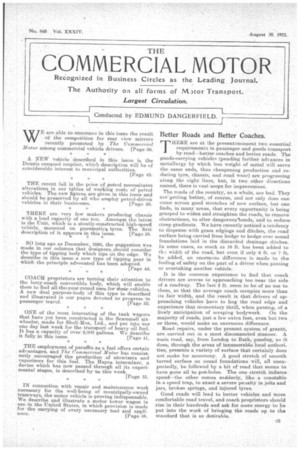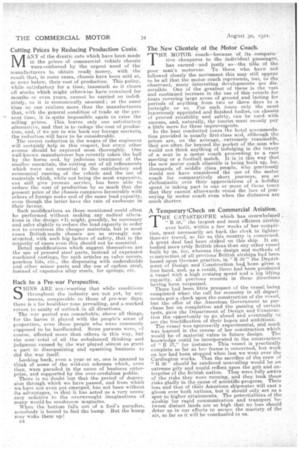Better Roads and Better Coaches.
Page 1

Page 2

If you've noticed an error in this article please click here to report it so we can fix it.
THERE are at the presentnnoinent two essential requirements in passenger and goods transport by road—better coaches and better roads. The goods-carrying vehicles (pending further advances in metallurgy by which less weight of metal will serve the same ends, thus cheapening production and reducing tyre, chassis, and road wear) are progressing along the Tight lines, but, in two other directions named, there is vast scope for improvement.
The roads of the country, as a whole, are bad. They are'getting better, of course, and not only does one come across good stretches of new surface, but one finds, in many areas, that every opportunity is being grasped to widen and straighten the roads, to remove obstructions, to alter dangerouebends, and to reduce steep gradients. We have recently noticed a tendency to dispense. with grass edgings and ditches, the road surface being carried from hedge to hedge over sound foundations laid in the discarded drainage ditches. In some cases, as much as 10 ft. has been added to th) width of the road', but even if only 6 ft. or 7 ft. be added, an enormous difference is made to the feeling of safety on the part of a driver when passing or overtaking another vehicle.
It is the common experience to find that coach drivers are averse to approaching too near the side of a roadway. The last 2 ft. seem to be of no use to them, so that the average coach occupies more than its fair width, and. the result is that drivers of approaching vehicles have to hug the road edge and experience that momentary thrill, when passing, of a lively anticipation of scraping bodywork. On the majority of roads, just a few extra feet, even but two or three, would make an enormous difference.
Road repairs, under the present system of grants, are carried out in a most disconnected manner. .A. main road, say, fromLondon to Bath, passing, as it does, through the areas of innumerable local authorities, presents a variety of surface that certainly does not make for monotony. A good stretch of smooth tarred surface on sound foundations will, all unexpectedly, be followed by a bit of road that seems to have gone all to pot-holes. The one stretch induces speed—the other comes suddenly, like a constable in a speed trap, to exact a severe penalty in jolts and jars, broken springs, and injured tyres.
Good roads will lead to better vehicles and more comfortable road travel, and coach proprietors should rise in their hundreds and ask for more energy to he put into the work of bringing the roads up to the standard that is so desirable.
Cutting Prices by Reducing Production Costs.
ToANY of the drastic cuts which have been made in the prices of commercial vehicle chassis weree-enforeed by the urgent need of the manufacturers to obtain ready money, with, the result that, in some cases, chassis have been sold at, or even below, their cost of production. This policy, while satisfactory for a time, inasmuch as it clears oft stocks which might otherwise ha,ve•reinained for months or even years, cannot be carried on indefinitely, as it is economically unsound; at the same time no one realizes more than the manufacturers that, with the general condition of trade at. the pro sent time, itisequite impossible again to raise the selling prices. This leaves only one satisfactory alternative, and that is to reduce the cost of production, and, if we are to win back our foreign markets, the reduction -will have to be considerable.
The recent reduction in the wages of the engineers will certainly help in this respect, but every other . avenue should be explored most thoroughly. One well-known manufacturer has recently taken the bull by the horns and, by judicious treatment of the smalleressentials, the -cutting out of all refinements which were not essential to the satisfactory and economical running of the vehicle and the use of -materials which, while net being .the most expensive, can still give yeoman service, has been able to reduce the cost of production by so much that the present price of the chassis compares favourably with others of foreign make and of the same load capacity, even though the latter have the rate of exchange in their favour.
Such modifications as those mentioned could often be performed without making any radical alterations in the design. s It might., possibly, be necessary and safer slightly to reduce the load capacity in order not to overstress the cheaper materials, but in most eases British-made chassis are so strongly constructed, with such big factors of safety, that in the majority of cases even this should not be essential.
Detail modifications which suggest themselves are the use of pressed steel parts, instead of expensive machined castings, for such articles as valve covets, gearbox lids, etc., the dispensing with undershields and other minor parts and the use of carbon steel, instead of expensive alloy steels, for springs, etc.
Hack ,3to a Pre-war Perspective. SIGNS ARE not wanting that while conditions throughout the industry are .not yet, by any , means, comparable to those of pre-war days, there is a far healthier tone prevailing, and marked return to sanity of outlook in all directions.
The war period was remarkable, above all things, for the havoc it played with the people's. sense of proportion, even thoee people who were commonly supposed to be hardheaded. Some persons were, ef course, affected snore than others in this way, but the sum' total of all the unbalanced thinking and judgment caused by the war played almost as great a part in disorganizing and upsetting business as did the -war itself.
Looking back, even a year or so, one is amazed to think of some of the wild-eat schemes which, even then, were paraded in the name of business enterprise, and supported by the over-credulous public. There is no doubt but that the period of depression through which we haye passed, and from which we have not even yet emerged, has not been without its advantages, in that it has acted as a very necessary sedative to the overwrought imaginations of many would-be mushroom magnates.
When the bottom falls out of a fool's paradise, somebody is bound to feel the bump. But the bump may wake them upl eel
The New Clientele of the Motor Coach.
THE. R THE. R MOTO coach—because of its comparative, cheapness to the individual passenger, has earned—and justly so—the title of the poor man's motorcar. To those who have not followed closely the moVement this may still appear to be all that the motor coach represents, but, to the observant, many interesting developments are discernible. One of the greatest of these is the vast and continued increase in the use of this vehicle for tours covering large areas of ground and lasting for .
periods of anything from two or three days to a tortnight or so. For such tours only the most luxuriously appointed and finished bodies, on chassis of proved reliability and safety, can be used with success, and, naturally, the tourist must usually pay a, little more for these improvements. In the best conducted tours the hotel accommodation provided is usually first-class and, although the prices are, on "the. average, extremely reasonable, they are often far beyond the pocket of the man who would not think anything of indulging in the luxury of a. seat in a motor coach proceeding to a race meeting or a football match. It is in this way that the new motor coach clientele is being built up, for, thousands of middle class people, who previously would not have considered the use of the motor, coach for comparatively short journeys, are so' e'nthusiastic over their appreciations of a holiday spent in taking part in one or more of these tours that they cannot afterwards resist, the lure of journeying by motor coach even when the distances are much shorter.
A Temporary Check on Commercial Aviation. THE CATASTROPHE which has overwhelmed .. " R 38," the largest and most efficient airship ever built, within a few weeks of her completion, must necessarily set back the clock in lighterthan-air travel, so far as this country is concerned. A great deal had been staked on this ship. It embodied more truly British ideas than any other vessel built by us, for, whereas the design and methods of ec nstructicm of all previous British airships had been based upon German practice, in "R 38' the Department of Design and 'Construction. had been given a free hand, and, as a result, there had been produced a vessel with a high cruising speed and a big lifting capacity, all previous records in these directions having been surpassed.
There had been little prospect of the vessel being completed when the call for economy in all departments put a check upon the construction of the vessel, but the offer of the American Government to purchase her on completion and the passing of certain tests, gave the Department of Design and Construction the opportunity to go ahead and eventually to see the fructification of their hopes and ambitions.
The vessel was necessarily experimental, and much was learned in the course of her oonstniction which would be .of material valuein future design. The knowledge eould be incorporated in the construction of " R 37," for instance. This vessel is practically complete so far as her frame is concerned, but work on her had been stopped when last we went over the CardinFton works. That the sacrifice of the crew of "R 38 should be rendered unavailing would be an extreme pity and would refleet upon the grit and enterprise of the British nation. They were fully aware of the risks they were running,. and they took those risks gladly in the cause of scientific progress. Their loss and that of their American shipmates will cast a gloom over both nations, but it should only act as a spur to higher attainments. The potentialities of the airship for rapid communication and transport between distant lands are so 'high that no loss should deter us in our efforts to secure the mastety of the air, so far as it will be vouchsafed to us.
































